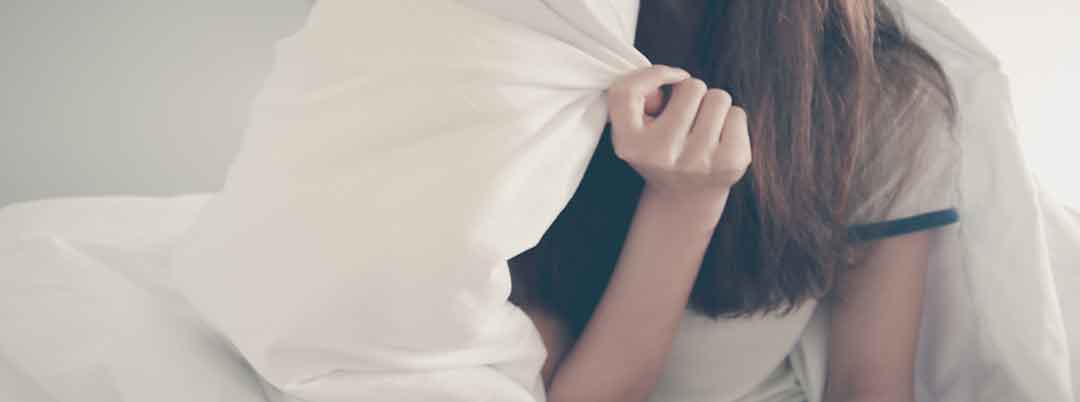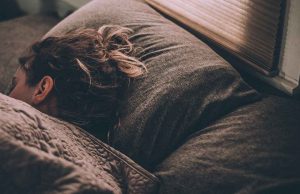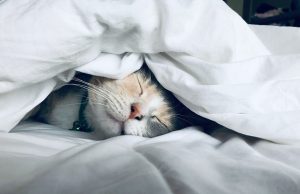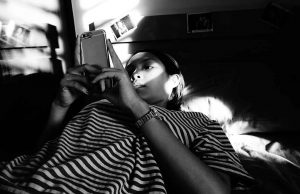
- Sleep plays an important role in our overall health and wellbeing—therefore, any disruption in our sleep cycle can prove harmful.
- Sleep deprivation results from our failure to fall or stay asleep; typically we can still function okay the next day, but we’ll likely experience some unwanted effects.
- Insomnia, on the other hand, is a serious sleep disorder characterized by the inability to fall or stay asleep at night, which makes normal functioning significantly difficult.
- In sum, it’s normal to have trouble falling or staying asleep every now and then; sleep disorders like insomnia, however, are alarming and can have a greater impact on our health if they go unaddressed.
- If you are experiencing any difficulty sleeping, it’s important you figure out why and seek out treatment, of which might include working with a mental health professional, taking medication, or improve self-care.
Back in my college days, there was a period of time—maybe two to three weeks—when I couldn’t sleep. I’d lay down, pull the covers up to my chin, and close my eyes tight. But nothing would happen. Or, at least, what I wanted to happen wouldn’t happen. Instead of drifting off to sleep, my mind would wander. And I couldn’t stop it: I couldn’t manually shut it off… I couldn’t exhaust it. I couldn’t even convince it to take a little break so that I could get some gosh darn sleep.
I started to wonder, of course, “why?” Why was my mind suddenly ravaging through all of its nooks and crannies? And why wouldn’t it listen to my commands to stop? Finally, I realized I was struggling with anxiety. All of the stresses that come with school were catching up to me, and my sleep deprivation was collateral damage. Fortunately, I learned how to properly deal with this stress and anxiety—I journaled, I tidied up my routine, I started saying no. And as a result, I was soon able to sleep at night again.
I’m one of the lucky ones. I was able to get to the root of the problem of my sleep deprivation and fix it rather quickly. Others aren’t so fortunate, as they suffer from sleep disorders like insomnia, the most common sleep disorder of all, which often require more extensive intervention. The good news is, though, that there is effective treatment out there—for your occasional case of sleep deprivation as well as insomnia. And a major key in resolving these issues is first determining whether you’re dealing with a mere blip in your sleep cycle or you’re suffering with something more serious like insomnia. Amy Moreira, Licensed Mental Health Counselor and Founder of More MH Counseling, is here to help us understand the difference.
What Is Sleep Deprivation?
We all have those nights where we just can’t fall or stay asleep—we’re too anxious or excited, we’re uncomfortable, or we’re simply not tired. Moreira explains:
“It is common to experience one or two nights of poor sleep, which results in sleep deprivation. Sleep deprivation consists of poor quantity and quality of sleep, but the person can still function the next day despite some fatigue. It can be triggered by environmental stressors such as work, relationships or finances as well as lifestyle issues such as staying up too late. Using effective coping strategies or making lifestyle changes can generally resolve sleep deprivation.”
The general gist is this: when you don’t get a great night’s sleep, you suffer from sleep deprivation. And while you might experience a few negative side effects the next day, they are but minimal. You should try getting to the bottom of why you can’t sleep so that you don’t continue to suffer from sleep deprivation.
What Is Insomnia?
Insomnia is more severe than mere trouble sleeping—it affects your sleep quality and makes normal day to day functioning difficult. Moreira delves deeper into this sleep disorder:
“Insomnia is characterized by insufficient sleep and/or poor sleep quality that disrupts next day functioning on most days of the week. The person experiences difficulty falling asleep, staying asleep, and/or early awakening, which results in poor memory and concentration, fatigue, irritability, and worries about sleep. Insomnia can vary in how long it lasts and how often it occurs which differentiates acute (short-term) vs. chronic (long-term) insomnia. Acute insomnia can last from one night to a few weeks, though it becomes chronic when insomnia is present at least three nights a week for more than three months.”
In sum, insomnia is characterized by lack of proper sleep and has a number of harmful side effects on your health that make normal functioning extremely difficult. Additionally, with insomnia, you might experience sleep disturbances for a couple nights and then it’s over (acute insomnia) or you might experience sleep disturbances every other night for months (chronic insomnia).
Treatment for Insomnia and Other Sleep Disruptions
If you are struggling to get a good night’s sleep, especially if there appears to be no end in sight, you should meet with a professional—whether that’s your general physician, a sleep doctor, or a psychiatrist. They can assess your situation, help you get to the bottom of your problem, and identify an effective treatment plan. Depending on your unique presentation, this treatment plan may consist of cognitive behavioral therapy as well as medication and self-care. “The most effective treatment consists of cognitive behavioral therapy for insomnia (CBT-i), sleep medications, or a combination of both,” Moreira explains.
Don’t just wait or hope for your sleep disturbance to resolve itself. Get to the root of the problem and seek treatment to ensure you don’t suffer another night from lack of restful sleep. Meet with a mental health professional today who can help you work through any underlying causes like stress, anxiety, and depression. They are eager to help.
Let’s keep in touch! Sign up to receive our newsletter:
Start a Relationship with An Exceptional Counselor
- Skilled and caring professional counselors
- Accepting all major and most insurances
- High-touch customer service & premium benefits
- Same- or next-day appointments
- Ultra-flexible 23.5hr cancellations













